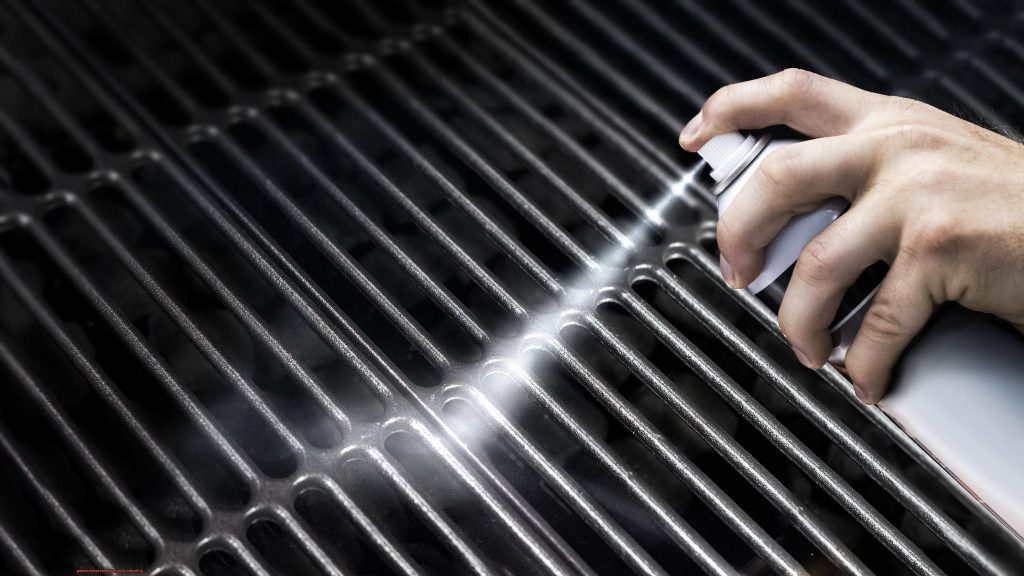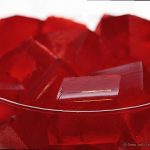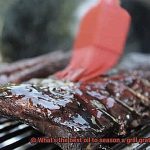Summer is upon us, and that means it’s time to break out the grill. The sun is shining, the company is great, and there’s nothing quite like the taste of food cooked over an open flame. But before you toss those juicy burgers and sizzling steaks onto your grill grates, you might be wondering whether or not you should oil them up first.
It’s a question that many grill enthusiasts ask themselves, and for good reason. Properly oiled grill grates can make all the difference in how your food turns out. However, there’s no one-size-fits-all answer – it really depends on what you’re cooking, how dirty your grill grates are, and what kind of grates your grill has.
In this blog post, we’ll explore the ins and outs of oiling your grill grates before cooking. We’ll cover everything from which oils work best to how much oil to use, and even when it’s appropriate to skip the oil altogether. By the end of this post, you’ll have a clear understanding of whether or not you should oil your grill grates before firing up that flame. So let’s get started.
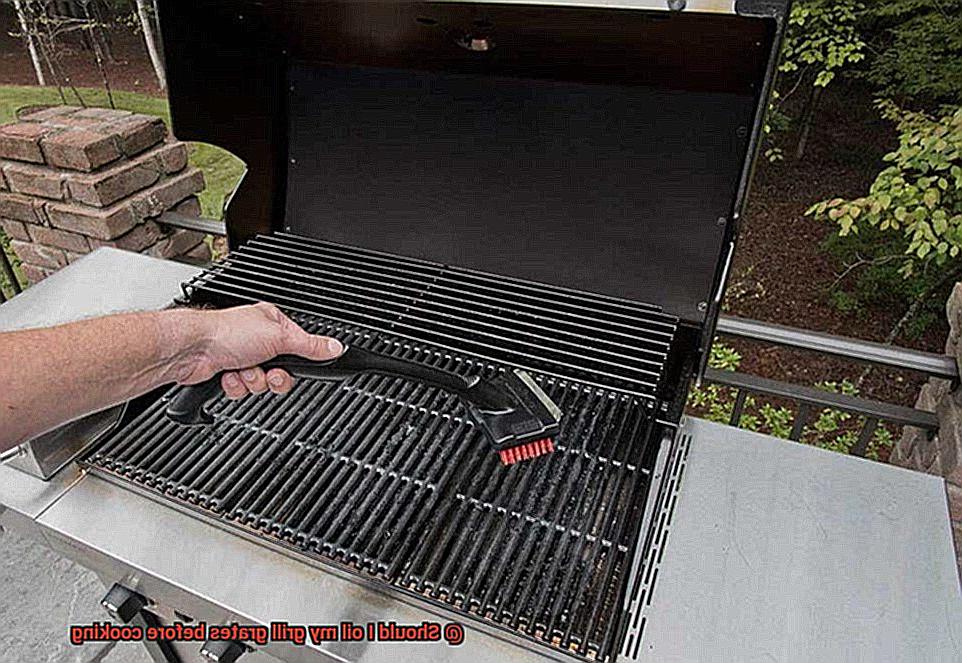
Contents
What is Grilling?
Grilling is more than a cooking method, it’s a celebration of summer. It’s the sound of sizzling meat and vegetables, the smell of smoke, and the feeling of warmth from the open flame or electric heat source. Whether you’re grilling outdoors on a gas or charcoal grill or indoors on an electric grill or stovetop grill pan, grilling is a versatile cooking technique that can be used to prepare a wide range of foods.
When it comes to grilling, there are two main types: direct and indirect. Direct grilling involves cooking food directly over the heat source, while indirect grilling involves cooking food next to the heat source with the heat source on one side of the grill and the food on the other. Direct grilling is perfect for thin cuts of meat like steaks and burgers, while indirect grilling is better suited for larger cuts of meat like whole chickens or roasts.
To ensure that your food cooks evenly and doesn’t stick to the grates, it’s essential to properly prepare your grill before cooking. One common question that many people have is whether or not they should oil their grill grates before cooking. The answer is yes. Oiling your grill grates prevents food from sticking and adds flavor to your food. There are several ways to oil your grill grates before cooking, including using a brush, a paper towel, or even an onion.
Grilling isn’t just for meat lovers either. You can also grill vegetables, fruits, and even desserts like pineapple or peaches. Grilled vegetables retain more nutrients than when boiled or fried, making them a healthy option. Grilled fruits are a sweet and refreshing dessert that everyone will love.
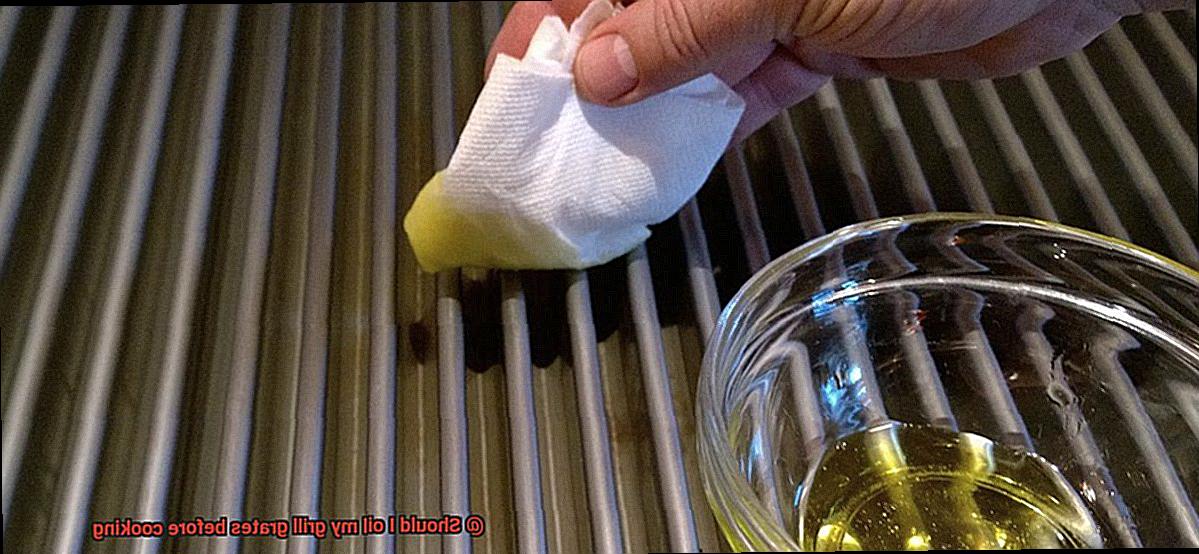
Why Should You Oil Your Grill Grates Before Cooking?
Summer is here and grilling season is in full swing. There’s nothing quite as satisfying as the sound of sizzling meat and veggies on a hot grill. But to make sure your food cooks evenly and doesn’t stick to the grates, there’s an important step you shouldn’t skip: oiling your grill grates before cooking.
Why is this step so crucial? Firstly, oiling your grill grates helps prevent food from sticking. When you cook on a dry grill, food can easily adhere to the grates, making it difficult to flip or remove the food without it breaking apart. This can be both frustrating and can lead to uneven cooking. However, by oiling your grates before cooking, you create a non-stick surface which allows the food to cook evenly and come off the grill when it’s ready.
Secondly, oiling your grill grates helps prevent rust and corrosion from forming. Grills are often exposed to moisture and other elements that can cause them to rust over time. To prevent this, coating your grates with oil creates a barrier between the metal and the elements, helping to keep your grill in top condition for years to come.
Lastly, oiling your grill grates can add flavor to your food. When you oil your grates, the oil penetrates the pores in the metal and infuses into your food as it cooks. This results in a subtle but delicious flavor that enhances the overall taste of your meal.
Different Ways to Oil Your Grill Grates
Grilling is not only a tasty way of cooking food but also a great way to get together with family and friends. However, sticking food on the grill grates can ruin the experience. To prevent this, you need to oil your grill grates before cooking. There are several ways to do this, each with its own advantages and disadvantages. Here are five different ways to oil your grill grates:
Brushing with Oil
One of the most straightforward methods is brushing the grates with a little amount of oil before cooking. This helps to prevent sticking and makes it easier to clean the grates afterward. You can use any type of oil you like, but many people prefer vegetable oil or canola oil because they have a higher smoke point than other oils.
Using a Spray Bottle
Another option is to use a spray bottle filled with oil to mist the grates before cooking. This method can be quicker and more convenient than brushing the grates, but it can also be messier if you’re not careful.
Dipping a Cloth in Oil
Some grillers prefer to use a paper towel or a cloth dipped in oil to coat the grates before cooking. This method allows for more control over how much oil is applied to the grates, and it also helps to prevent flare-ups that can occur when using too much oil. However, it can be time-consuming and may require more oil than other methods.
Using Cooking Spray
Cooking spray is another easy way to oil your grill grates. Simply spray the cooking spray onto the grates and use tongs to spread it evenly. However, be careful not to spray too much as it can cause flare-ups.
Applying Butter
While butter has a low smoke point, it adds flavor when used sparingly. To use butter, melt it in a small bowl and use a pastry brush to apply it to the grill grates.
No matter which method you choose, it’s important to remember that you don’t need to use a lot of oil. Just a light coating is all that’s necessary to prevent sticking and ensure even cooking. And always be sure to let your grill preheat before adding any food to the grates, as this will help the food cook evenly and prevent sticking.
Benefits of Oiling Your Grill Grates Before Cooking
Grilling is a beloved pastime that brings people together, but the frustration of food sticking to the grates can quickly put a damper on the fun. Fortunately, oiling your grill grates can prevent this common problem and offer numerous other benefits that enhance the quality and flavor of your food. As an expert on this topic, I have compiled some research notes to explain why oiling your grill grates before cooking is a must.
Firstly, oiling your grill grates prevents food from sticking and tearing, resulting in evenly cooked and visually appealing dishes. Say goodbye to the annoyance of having to scrape burnt bits off your grates and hello to perfectly cooked meals every time.
Secondly, oiling your grill grates helps create those coveted sear marks we all love. The oil conducts heat more efficiently, allowing for a higher temperature on the grill surface. The high heat creates those aesthetically pleasing charred lines on your food, providing a delicious flavor profile that will have your taste buds singing.
Thirdly, oiling your grill grates can help extend the life of your grill. Over time, grime and residue build-up can cause rust and corrosion, leading to costly repairs or even replacement. Oil acts as a protective barrier between the grime and the metal, preventing it from accumulating and causing damage. Regularly oiling your grill grates can save you money in the long run by prolonging the life of your beloved grill.
Lastly, oiling your grill grates makes cleaning up after a cookout much easier. The oil helps reduce the amount of food that sticks to the grates and prevents residue from building up. This means less time scrubbing and more time enjoying the company of friends and family.
Tips for Oiling Your Grill Grates Before Cooking
Grilling is a beloved cooking method that brings out the best flavors in food. When it comes to grilling, ensuring you have properly oiled grill grates is essential. However, there is much debate on whether or not to oil your grill grates before cooking. We’re here to tell you that it’s necessary. Here are five steps for properly oiling your grill grates:
Choose the right oil
Not all oils are created equal for grilling purposes. For high-heat cooking like grilling, it’s best to use an oil with a high smoke point, such as vegetable oil, canola oil, or grapeseed oil. These oils won’t burn off quickly and will create a non-stick surface on your grates.
Clean the grates
Before you start oiling your grill grates, ensure they’re clean and free of debris. You can use a grill brush or scraper to remove any leftover food particles or rust. A clean surface ensures that the oil will adhere well to the grates.
Apply the oil
Use a brush or paper towel to apply a thin layer of oil evenly over the surface of the grates. It’s crucial not to use too much oil, as this can cause flare-ups and affect the flavor of your food.
Preheat the grill
To ensure that the oil gets infused into the metal and creates a non-stick surface, preheat your grill on high for at least 10-15 minutes after oiling the grates. This step also helps to kill any bacteria on the grates.
Oil again after cooking
After you’ve finished cooking, it’s a good idea to oil your grill grates again while they’re still warm. This helps prevent rust and keeps them in good condition for future use.
How to Clean Your Grill After Oiling the Grates
Grilling is an enjoyable and delicious way to cook food, but it can quickly turn into a messy and unsafe experience if you don’t know how to clean your grill properly. If you have oiled the grates before cooking, cleaning your grill becomes even more crucial. Here are some detailed steps to help you clean your grill after oiling the grates:
Let the Grill Cool Down Completely
Before you start cleaning your grill, make sure it has cooled down completely. Attempting to clean a hot grill can cause serious injury, so be patient and wait until it’s safe to touch.
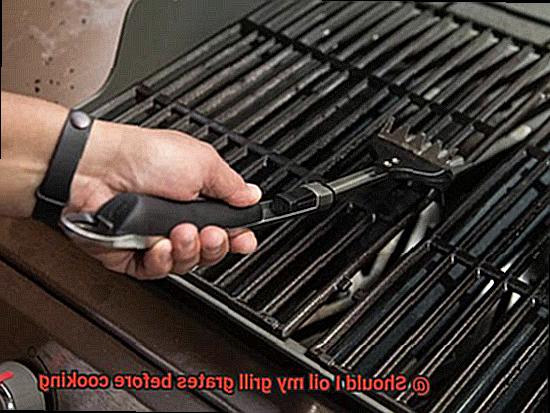
Remove Excess Food Debris
Once the grill has cooled down, use a wire brush or scraper to remove any excess food debris from the grates. This will make it easier to clean the grates thoroughly.
Use a Cleaning Solution
If there is still excess oil on the grates, use a mixture of equal parts vinegar and water to help break down the oil. Simply spray or pour the solution onto the grates and let it sit for a few minutes before wiping it clean with a damp cloth. Alternatively, you can use a specialized grill cleaner to tackle tougher grease and grime.
Scrub the Grates
After using the cleaning solution, scrub the grates thoroughly with a wire brush or aluminum foil ball to remove any remaining food particles or grease buildup. Avoid using soap on the grates as it can leave behind residue that affects the taste of your food.
Wipe Down the Grates
After scrubbing the grates, wipe them down with a damp cloth or paper towel to remove any remaining debris. If you oiled the grates before cooking, be sure to wipe away any excess oil as well.
Clean Out Drip Pan and Ash Catcher
Lastly, don’t forget to clean out the drip pan and ash catcher if your grill has them. These areas can accumulate grease and debris over time and should be emptied regularly to prevent fire hazards.
Different Types of Oil to Use on Your Grill Grates
Grilling is an art that requires not only skill but also the right tools and techniques. One of the essential components of grilling is oiling your grill grates. While it’s crucial to oil your grill grates before cooking, it’s equally important to use the right type of oil for the best results. Here are five different types of oils to use on your grill grates and their benefits.
Vegetable Oil
A popular option for grilling, vegetable oil is a neutral-tasting oil that works well for most types of food. What makes this oil ideal for grilling is its high smoke point, which means it can withstand high heat without burning or imparting unwanted flavors to your food. Additionally, vegetable oil helps prevent sticking and makes cleaning your grill grates much more manageable.
Canola Oil
Another neutral-tasting oil with a high smoke point is canola oil. It’s an excellent choice for grilling delicate foods like fish or vegetables because it won’t overpower their natural flavors. Canola oil is also low in saturated fats and high in healthy unsaturated fats, making it a healthier option for grilling.
Olive Oil
If you’re looking for a more robust flavor, olive oil is an excellent choice. It has a distinct taste that can complement a variety of grilled foods, such as meats and vegetables. However, olive oil has a lower smoke point than vegetable or canola oil, so be mindful of the heat you’re using when grilling with it.
Specialty Oils
For those who want to add depth to their grilled dishes, specialty oils like sesame, peanut, or avocado oil are a great option. These oils have unique flavors and properties that can enhance the taste of your food. However, they tend to be more expensive and may not be suitable for all types of food.
Coconut Oil
Ideal for those following a paleo or keto diet, coconut oil has a high smoke point and adds a slightly sweet flavor to grilled foods. Although it can be more expensive than other oils, it’s an excellent option for those who want to add a tropical twist to their grilled dishes.
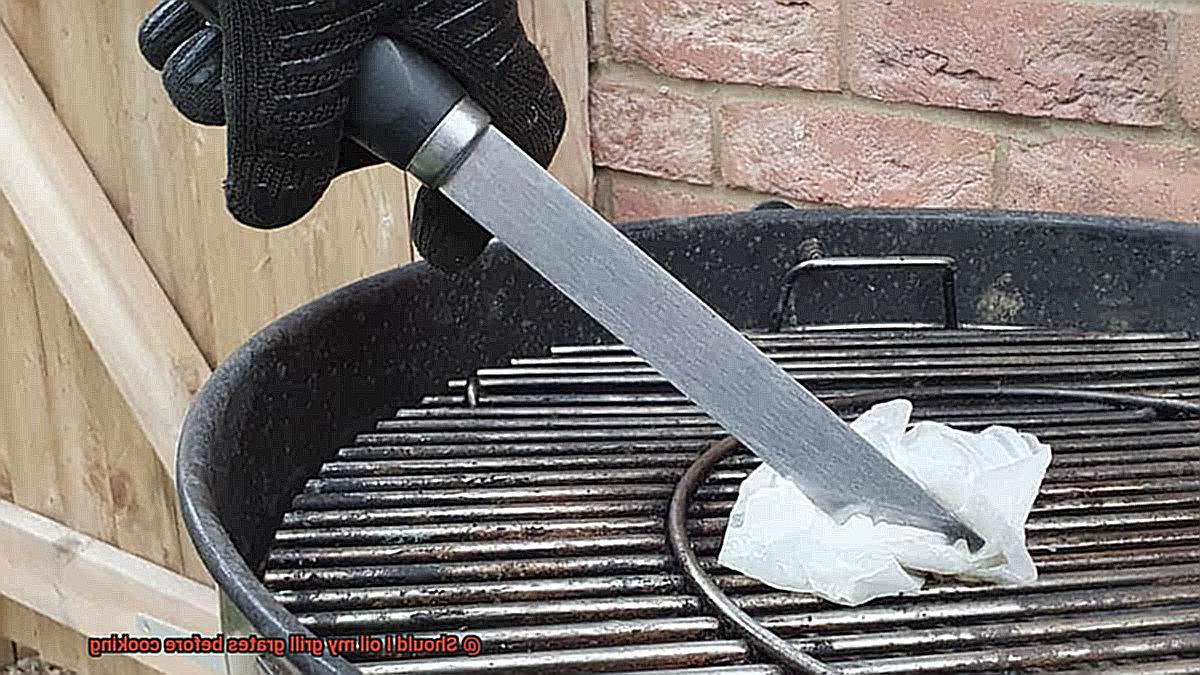
Safety Considerations When Oiling and Cleaning Your Grill
Grilling is a beloved pastime, but it’s essential to prioritize safety when it comes to oiling and cleaning your grill grates. As an expert, I’m here to share some crucial considerations and safety tips.
Firstly, ensure that your grill has completely cooled down before you begin oiling or cleaning the grates. This will prevent any accidents or burns. When selecting an oil, choose one with a high smoke point, such as canola or vegetable oil, to avoid harmful smoke and fires.
When applying the oil, use a brush or paper towel to evenly coat the grates. Avoid using too much oil, which can lead to flare-ups and dangerous situations. After oiling, let the grill heat up for a few minutes before adding food to prevent sticking and ensure even cooking.
Cleaning your grill grates is just as important for safety reasons. Clean them after each use to prevent leftover food or debris from attracting pests or causing flare-ups. Start by using a grill brush to remove large debris before wiping the grates down with a damp cloth or paper towel.
If your grates are particularly dirty, using a grill cleaner designed explicitly for grates can be helpful. Follow instructions carefully and avoid using harsh chemicals that could damage your grill or harm the environment.
R0uXRTXori0″ >
Conclusion
In conclusion, oiling your grill grates before cooking is an essential step that can elevate your culinary creations to the next level. Not only does it prevent food from sticking and impart a delectable taste to your dishes, but it also safeguards the longevity of your grill and streamlines the cleaning process. When selecting an oil, go for one with a high smoke point, such as vegetable or canola oil, to steer clear of hazardous smoke and fires.
You have various methods at your disposal for oiling your grill grates, including brushing with oil, using a spray bottle, dipping a cloth in oil, applying cooking spray or slathering butter. Whatever technique you choose, ensure that you apply a thin layer evenly across the surface of the grates.
After cooking, it’s critical to sanitize your grill grates thoroughly to preclude any leftover food or debris from attracting pests or causing flare-ups. Use a wire brush or scraper to eliminate any excess food debris before wiping down the grates with a damp cloth or paper towel.
By adhering to these tips and safety precautions when oiling and cleaning your grill grates, you’ll be able to relish perfectly cooked and scrumptious meals all summer long.

